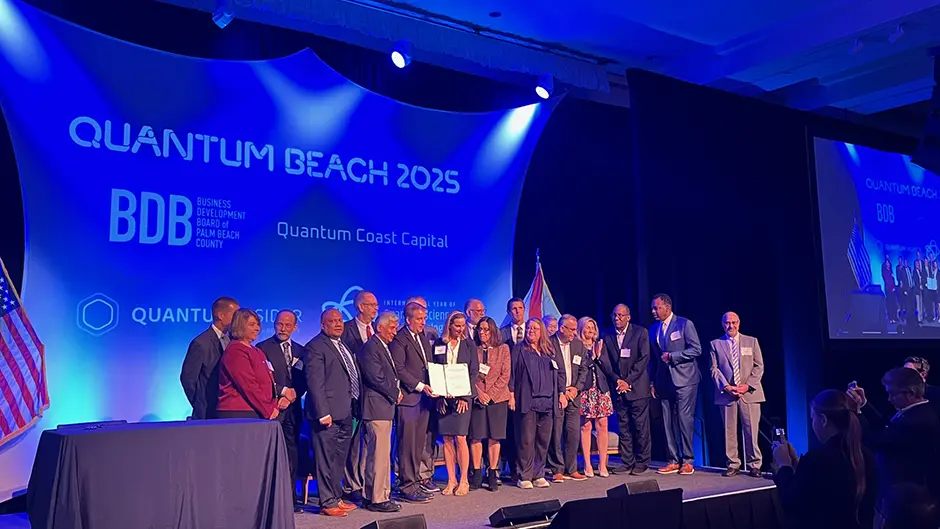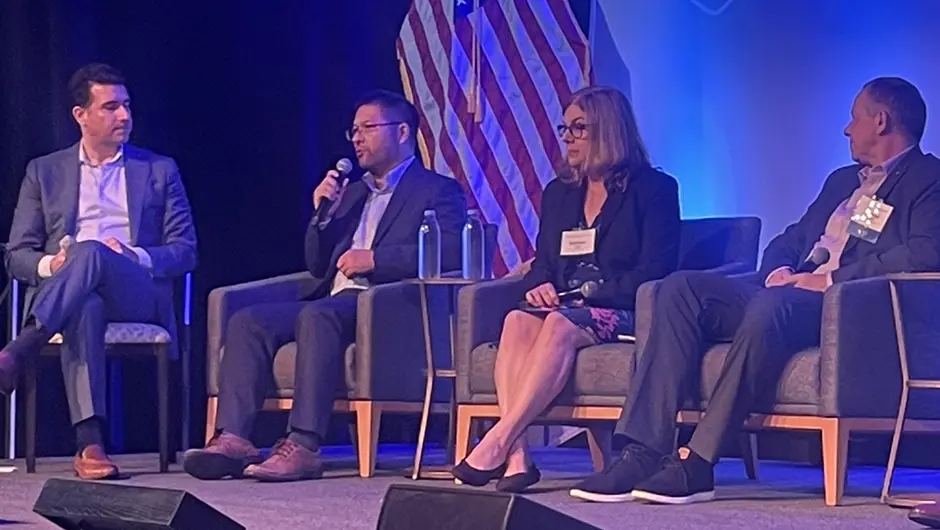The phone or computer on which this article is displayed was made possible thanks to the first revolution in quantum science, developments in the early 20th century that led to technologies like the transistor, lasers, MRI machines, and GPS.
Now, with the second quantum revolution on the horizon, the University of Miami is joining the Florida Alliance for Quantum Technology, a collaborative effort that brings together universities, government agencies, and the private sector to make Florida a national leader in this field.
The College of Arts and Sciences—home to more than a dozen faculty members whose research involves quantum technologies—is leading the University's participation in the alliance.
"Joining the alliance places the college at the forefront of this exciting research discipline," said Leonidas Bachas, the college's dean. "We look forward to building connections with industry partners, government entities, and other universities in the alliance to strengthen our research and academic programs in this area."
The excitement around quantum technologies is driven in part by the promise of quantum computing, a technology still in the early stages of development that uses quantum bits or "qubits" to perform complex calculations that would take a standard computer far longer than a human lifespan to complete. The 2025 Nobel Prize in Physics was awarded to a trio of physicists for their research demonstrating that a macroscopic superconducting circuit exhibits the same quantum mechanical properties as a single atomic particle. This work laid the foundation for today's superconducting qubits, one of the principal platforms in the global effort to build practical quantum computers.
Quantum sensing and quantum communication, the other two branches of quantum technologies, are also generating enthusiasm among researchers and investors. Quantum sensing, which leverages the enhanced sensitivity of quantum systems to make more acute measurements, has potentially transformative applications in medical imaging and national defense. Quantum communication, which is the most developed of the three branches, enables the creation of ultra-secure communication networks that better protect data.

The goals of the Florida Alliance for Quantum Technology include supporting research and entrepreneurship, as well as the development of a "quantum-ready workforce," according to a memorandum of understanding that alliance members signed on Oct. 8, 2025, at the Quantum Beach 2025 conference in West Palm Beach, Florida.
"Having a network of research groups providing broad-based expertise will be a leverage point for larger federal grant applications," said Joshua Cohn, the college's senior associate dean for research and graduate education, who is also a professor of physics.
Cohn added that he sees many opportunities for universities to collaborate with the private sector as they prepare students to work in this field.
"There's a workforce of intellectual capital that's going to come out of universities that can flow into industry," he said. "We anticipate outreach from industry and from universities in order to define workforce needs and translate those into curricular and training activities within academia."
In addition to offering courses and research opportunities in quantum technologies through undergraduate and graduate degree programs, Cohn said future possibilities include creating quantum certificates that are recognized by companies in the field.

Developing robust quantum technologies programs at universities in Florida will also help attract new quantum companies to the state, said Hebin Li, a physics professor at the college who conducts research in quantum computing and quantum sensing.
"The biggest goal of this alliance is to build up the quantum ecosystem, including universities, investment firms, and industry start-up companies," he said. "One important thing is that you need to be able to supply human resources. That's one of the roles that universities are going to play, because we're going to supply the talent in the 'quantum-ready workforce.'"
The college has already begun to invest in quantum technologies. During the 2023–2024 academic year, the college launched a hiring initiative, recruiting three new faculty members who specialize in this area: Li in the Department of Physics; Stephen Lee, an assistant professor in the Department of Chemistry; and Danila Barskiy, an associate professor in the Department of Chemistry. A fourth faculty member specializing in quantum information/computing will start working at the college in the Fall of 2026.
These new faculty members join faculty in the departments of physics, chemistry, biology, and computer science who conduct research in quantum science and technology, along with faculty members in the College of Engineering.






